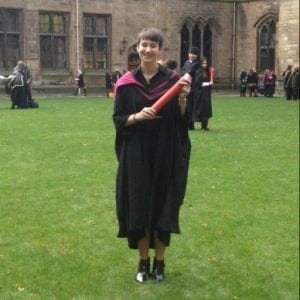For this week’s ‘Women in Law Wednesday’ we have chosen Seonaid Stevenson-McCabe, who we had the pleasure of talking to. We found out all about her journey in the legal profession so far, discussed inequality in law and some inspiring advice was shared.
In her relatively short career Seonaid has achieved an incredible amount. In 2012 she graduated with a 1st class degree in Law and English Literature from the University of Glasgow before studying for an LLM in International Law, which was funded by the Carnegie Cameron Scholarship. She then worked at the International Criminal Court in The Hague before returning to Glasgow to study for the Diploma in Professional Legal Practice (graduating first in her year). Seonaid then trained at Maclay, Murray and Spens (now Dentons) and is now a human rights lawyer with The Ethnic Minorities Law Centre in Glasgow. She also works part time as a Research Assistant with the University of Glasgow on their project celebrating the centenary of women in law (https://www.gla.ac.uk/schools/law/100years/).
Seonaid is the co-founder of RebLaw Scotland, something that we were especially interested in talking to her about. Throughout the interview, the clear theme was Seonaid’s passion for social justice and using law as a tool to achieve that. Which is exactly what the ‘rebellious lawyering’ project is about. ‘Rebellious lawyering’ is a movement founded by the UCLA academic, Professor Gerald López, which has resulted in the annual Yale RebLaw conference. Seonaid attended the first RebLaw conference in the UK in London during her traineeship and brought the idea of a similar Scottish conference back up to Glasgow. She co-founded RebLaw Scotland with Mairi McAllan and Katy MacAskill, women who she trained with at Maclay Murray Spens. The friendship between the three, Seonaid notes, was one of the highlights of her traineeship.
RebLaw Scotland hosts an annual conference, where they bring together professionals from the third sector, from academia, and practising lawyers, to talk about tackling social problems through radical lawyering. In recent years they have discussed legal responses to homelessness, refugee rights and tackling forced marriage. Seonaid also talks of other plans, such as visiting law schools around Scotland in the new year. We would strongly encourage anyone reading to keep an eye out for upcoming RebLaw Scotland events!
Another interesting part of Seonaid’s journey so far is that she initially did not want to be a practicing solicitor. When she first went into her undergraduate degree, she wanted to be a journalist but realised that she did really enjoy the law, even the ‘boring’ bits! She still however did not opt to do the diploma after graduation and worked for a small charity as a research and policy officer before completing her LLM. She then started work at the International Criminal Court, which is where she finally decided she wanted to qualify as a lawyer. In The Hague she saw human rights law in practice and decided that she wanted to be able to advocate on behalf of victims of human rights abuses in the judicial system. This is what then pushed her to go back to Glasgow and undertake the diploma and traineeship.
Despite her achievements, Seonaid was keen to explain that it hasn’t been all plain sailing and she points to many incredible women in her life who have helped her along the way. She highlighted in particular the support of her mum, who is also a lawyer, which she notes has undeniably placed her in a privileged position. She said “I think every achievement I have ever made is thanks to her” and that, therefore, “women supporting women is such an important principle for me.”
As an example of this, Seonaid told us about feeling like an imposter when she first moved to The Hague. Helena Kennedy QC, author of ‘Eve Was Framed’ (and more recently ‘Eve Was Shamed’) had long been an inspiration for Seonaid. Helena Kennedy QC was an alumna of Seonaid’s secondary school, one of the largest comprehensive schools in the UK. Seonaid explained that she would regularly read ‘Eve Was Framed’ as a source of inspiration when her confidence was failing. Struggling with her confidence when she first moved to The Hague, Seonaid picked up the book and decided to email Helena Kennedy QC to thank her, never expecting a response. She was stunned to receive a reply, filled with encouragement. This small act of kindness demonstrated to Seonaid how powerful it can be for women to support one another. She goes on to explain that the feeling that she got from the email – that she was not alone – inspires her work with the University of Glasgow ‘100 Voices for 100 Years’ project. “When you read the voices of other women saying isn’t this hard, isn’t this difficult, it makes you realise that it is not just you that feels like that, other women do too.” She explained that the project is a space for talking about gender equality but that there also needs to be wider changes in terms of diversity in the legal profession, particularly in terms of representation of those from ethnic minority backgrounds.
Finally, we asked Seonaid the question we ask all our interviewees – what does being a women in law mean to you?
“It means that I am in a privileged position to use my voice to support vulnerable women. I try to do that in my work with migrant women, and I try to do that to support other women in law to achieve what they want to. Being a lawyer is a massive privilege and I think that we should use that little bit of power for good.”
We are very grateful to Seonaid for sitting down with us and talking about her experiences, and we think she may be on the receiving end of emails such as the one she sent to Helena Kennedy QC in the not too distant future.
By Lucy Mackay